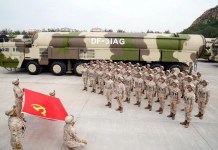The US Navy once again finds itself in a spot. Two of its new MQ-8C Fire Scout unmanned helicopters, developed by Northrop Grumman, suffered serious accidents within a week, following which the entire fleet was grounded.

The first incident occurred at the Naval Air Station Point Mugu in California on November 10 when the Fire Scout crashed during its final approach to the ground. Six days later, another Fire Scout at Naval Outlying Field Webster in Maryland become unresponsive and was “choked and chained” during a high-power maintenance ground turn to test a new battery, according to the Safety Center report.
“Rotor blades ultimately came in contact with the ground causing blade separation and aircraft damage,” the report stated. There were no injuries in both accidents but both were listed as ‘Class A’ mishaps, which means the damages were of $2.5 million or more.
“All MQ-8C flights and ground rotor turns are on operational pause during the investigation,” said Jamie Cosgrove, with Naval Air Systems Command. The Navy didn’t reveal the cause of the accidents but said it takes every aircraft accident “extremely seriously”.
“We will examine the results of the investigation and apply lessons learned throughout the force as appropriate so that we can become even better operators and maintainers,” Cmdr. Zach Harrell, a Naval Air Forces spokesman said. It is still unclear how long the fleet of MQ-9C Fire Scouts will remain grounded.
The Fire Scout is a combat-proven, autonomous helicopter system providing real-time intelligence, surveillance, reconnaissance and target-acquisition (ISR&T), laser designation and battle management to the US Navy. The 34.7 feet aircraft is capable of reaching the maximum speed of 135 kts and has an endurance of 12 hours.
The MQ-8C Fire Scout is the Navy’s next-generation autonomous helicopter and its airframe is based on the commercial Bell 407, a mature helicopter with more than 1,600 airframes produced and over 4.4 million flight hours, according to the maker of the aircraft. The unmanned helicopter is currently deployed on a Littoral Combat Ship (LCS) and is equipped with a multi-mode maritime radar and the Advanced Precision Kill Weapon System (APKWS).
This isn’t the first time that the Fire Scouts have been grounded. In 2012, the US Navy grounded the MQ-9B Fire Scouts after two serious accidents. One helicopter was crashed in Afghanistan and the other was ditched in the sea.
In 2010, another MQ-9B operator lost control of the aircraft in Washington D.C. and trespassed the restricted airspace in the capital. A “software anomaly” was identified as the cause and was considered a more serious incident. Military officials described it as a “learning experience”.
“Folks who really didn’t understand how they work will now get a better understanding of the safeguards that are in place and a better knowledge of the engineering rigor that goes into the systems,” Rob Murphy, the Navy’s integrated products team leader for the Fire Scout program said at the Association for Unmanned Vehicle Systems International (AUVSI) conference. “The operators did lose communication, but they were able to regain it. The system operated like it was supposed to.”




